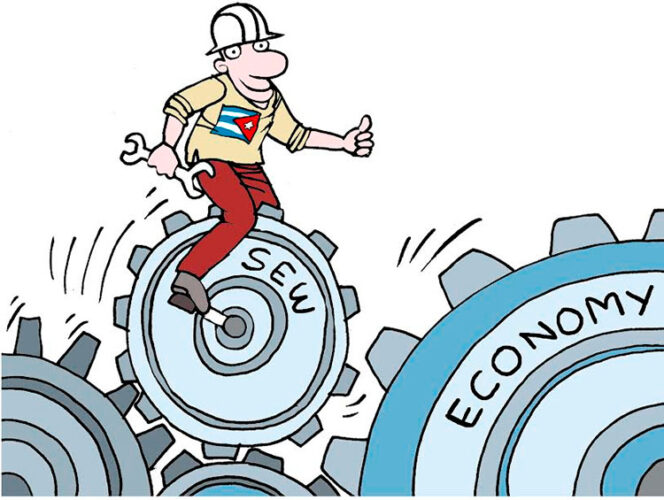 How is a non-agricultural cooperative formed?
How is a non-agricultural cooperative formed?
The non-agricultural cooperative is an economic entity of an entrepreneurial nature, formed by the voluntary association of persons who contribute money, other goods and rights for the satisfaction of the economic, social and cultural needs of its owner-members, as well as the social interest, based on their work and the effective exercise of the principles of cooperativism universally recognized and ratified by the Cuban State. It has legal personality and its own patrimony; it has the right to use, enjoy and dispose of the assets it owns; it covers its expenses with the income it generates and responds with its patrimony to the obligations it contracts with its creditors.
What is the minimum number of people needed to form a NAC?
The non-agricultural cooperative is classified as a worker cooperative and is made up of at least three people, called members, where each member’s main contribution is his or her personal work.
What are the membership requirements?
It is necessary to be a Cuban with effective residence or a foreigner with permanent residence in Cuba, in both cases over eighteen years of age; to be able and to demonstrate the knowledge and ability to perform the productive or service tasks to be carried out in the Cooperative. It is incompatible with the condition of agricultural member: being a state or government employee or official, or occupying elective positions of a professional nature in a state body; having been sanctioned for crimes incompatible with the activity of the cooperative or for those related to acts of corruption, during the fulfillment of sanctions imposed by the competent court; losing the condition of effective residency in Cuba for Cubans or permanent residency for foreigners, and other limitations established in the by-laws or current legislation.
What are the guiding principles of NACs?
Voluntariness; cooperation and mutual assistance; collective decision-making and equal rights of members; economic autonomy and sustainability; cooperative discipline; social responsibility, contribution to the well-being of members and their families, the environment and the community; collaboration and cooperation between cooperatives and other entities; education and training of members in the activities to be developed, so that they are carried out with effectiveness, efficiency and quality; in the principles of cooperativism and ensure the training of those who occupy positions of management and administration to acquire or improve their administrative management and leadership.
What are their powers?
To export and import in accordance with its corporate purpose and in compliance with the provisions of the legislation in force; to manage and administer its assets; to define the products and services to be marketed in accordance with its corporate purpose, as well as its suppliers, customers, destinations and insertion in the markets; to operate bank accounts and access any legal source of financing; Determine the prices of its services and goods in accordance with the provisions of the Ministry of Finance and Prices, except those that are subject to centralized approval; determine the system of remuneration of its members; determine the income of hired workers; make the investments necessary for its development, create establishments that are part of its organizational structure and that do not have legal personality, inside or outside the province where its registered office is located, that are approved by the Municipal Administration Council. In addition, the non-agricultural cooperative promotes and facilitates the participation of its members in trade union organizations.
What are the rights of a hired worker?
Non-agricultural cooperatives may hire workers for a period of up to three months within the calendar year, for the reasons established by the legislation in force. Exceptionally, the duration of the contract may be longer than three months if the worker replaces a member protected by the social security system due to temporary disability or maternity. Recruitment may not exceed ten percent of the number of members of the cooperative. The wages of the hired workers are determined by agreement between the non-agricultural cooperative and the worker, based on the minimum wage recognized in the country and the quantity and quality of the work to be performed. The rights of the hired worker, including social security and its disciplinary regime, are governed by the provisions of the labor legislation in force, and the tax provisions are applicable to them. At the end of the three-month period, the Cooperative may give the temporary worker the opportunity to apply for membership if it still needs his services; if he does not accept, the employment relationship is terminated.
What is the highest governing body of a non-agricultural cooperative?
The General Assembly is composed of all members, who decide on the matters of the Assembly in the manner established by law. All members are obliged to comply with its decisions, even those who do not agree with them or did not participate in the meeting. The Assembly elects a president from among the members of the governing body, who will be the president of both the governing body and the non-agricultural cooperative.
How is the purpose of the cooperative approved?
On the basis of a submitted project that describes the business to be carried out and identifies the legal economic activities authorized in accordance with the provisions of current legislation.
It is made up of the main activity and the ancillary activities; the latter must be fundamentally related, must not be detrimental to the main activity and must correspond to the real conditions of the business to be carried out. For the beginning and the exercise of their activities, they may require the corresponding licenses, authorizations or registrations; the exercise of the activities that require them without the corresponding licenses and authorizations constitutes an unlawful act that generates liability. In the event that it is intended to modify the corporate purpose of the non-agricultural cooperative, a new authorization from the Municipal Administration Council is required. The opening of a commercial establishment and the change of its domicile also require the authorization of the Local Council.
How will the results of the work be shared among the partners?
The non-agricultural cooperative, at the end of the fiscal year, once its financial and fiscal obligations have been met and the established funds and reserves have been created, determines, with the approval of the Assembly, the share to be distributed among the members and any other possible use. The net profit to be distributed shall be deemed to be the profit obtained when the overdue debts to the State budget, overdue credits to banking institutions and other obligations approved by the Assembly have been fully paid. Of the profits obtained at the end of the financial year, a percentage shall be allocated to the mandatory reserve for losses and contingencies, by decision of the Assembly. The non-agricultural cooperative that incurs losses must first cover them with this reserve. The cooperative may create voluntary reserves as it deems necessary to achieve its objectives.




